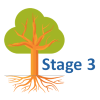How do you know if the items of a test are hard or easy; fair or biased; accurate at measuring ability or not? 
Item Response Theory (IRT).
In this training, you will see, with real life examples, how IRT answers these questions to assess a test.
How do you know if the items of a test are hard or easy; fair or biased; accurate at measuring ability or not? 
Item Response Theory (IRT).
In this training, you will see, with real life examples, how IRT answers these questions to assess a test.
Item Response Theory (IRT) refers to a family of statistical models for evaluating the design and scoring of psychometric tests, assessments and surveys. It is used on assessments in psychology,  psychometrics, education, health studies, marketing, economics and social sciences — assessments that involve categorical items (e.g., Likert items).
psychometrics, education, health studies, marketing, economics and social sciences — assessments that involve categorical items (e.g., Likert items).
In this webinar, you will learn about:
This webinar will introduce you to the basic ideas and applications of IRT, and show how you can acquire the skills necessary to conduct IRT analysis at the professional level.
 David Lillis is an applied statistician in Wellington, New Zealand.
David Lillis is an applied statistician in Wellington, New Zealand.
His company, Sigma Statistics and Research Limited, provides online instruction, face-to-face workshops on R, and coding services in R.
David holds a doctorate in applied statistics and is a frequent contributor to The Analysis Factor, including our blog series R is Not So Hard.
Just head over and sign up for Statistically Speaking.
You'll get access to this training webinar, 130+ other stats trainings, a pathway to work through the trainings that you need — plus the expert guidance you need to build statistical skill with live Q&A sessions and an ask-a-mentor forum.